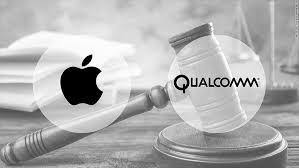
Qualcomm Inc was dealt a blow in its legal fight against iPhone Apple Inc., after a U.S. trade judge refused to pass an order to prevent the import of Apple iPhones fitted with Intel chips.
While agreeing to the allegations that there was a case of infringement of one Qualcomm patent related to power management technology in Apple’s iPhone, a U.S. International Trade Commission judge however refused to agree to put a ban on the import of iPhones into the US.
Qualcomm’s request for a ban in iPhone import ban was refused on the basis of “public interest factors”, said Thomas Pender, an administrative law judge at the ITC.
Other judges however would review the ruling. Another patent case against Apple by Qualcomm before the ITC is still pending.
Qualcomm had unfairly demanded royalties for technologies it had nothing to do with, Apple had said in an earlier statement.
“We’re glad the ITC stopped Qualcomm’s attempt to damage competition and ultimately harm innovators and U.S. consumers,” Apple said.
While expressing satisfaction that the court had agreed that there was case of infringement of its patent by Apple, Qualcomm general counsel Don Rosenberg said in a statement that “it makes no sense to then allow infringement to continue by denying an import ban.”
“That goes against the ITC mandate to protect American innovators by blocking the import of infringing products,” Rosenberg said. “There are many ways Apple could stop infringing our technology without affecting the public interest”, the statement said.
There have been a number of legal disputes between Apple and Qualcomm, the largest smartphoone chip maker in the world which includes one allegation by Apple claiming unfair patent licensing practices by Qualcomm. Apple in turn has been accused by Qualcomm of patent infringement.
The current case at the ITC against Apple was filed in July 2017 by the San Diego, California-based Qualcomm. In the legal suit, Qualcomm had alleged that six of its patents had been infringed upon by those iPhones that had chips made of Intel. Those patents are related to enhancing performance of the smartphones while not draining out the battery.
In the case, Qualcomm had argued that the manner in which Apple had used the chips had violated its patent but did not directly accuse Intel of infringing on its patents.
Qualcomm had “publicly disparaged Intel’s products” to be inferior to Qualcomm’s during the case, said Intel’s general counsel, Steven Rodgers, in a blog post on Friday.
“It is easy to say things, but Intel’s track record is clear,” Rodgers wrote in his post. “Every day, we push the boundaries of computing and communication technologies. And, the proof is in the pudding: last year, the U.S. Patent Office awarded more patents to Intel than to Qualcomm,” he said
(Source:www.reuters.com)
While agreeing to the allegations that there was a case of infringement of one Qualcomm patent related to power management technology in Apple’s iPhone, a U.S. International Trade Commission judge however refused to agree to put a ban on the import of iPhones into the US.
Qualcomm’s request for a ban in iPhone import ban was refused on the basis of “public interest factors”, said Thomas Pender, an administrative law judge at the ITC.
Other judges however would review the ruling. Another patent case against Apple by Qualcomm before the ITC is still pending.
Qualcomm had unfairly demanded royalties for technologies it had nothing to do with, Apple had said in an earlier statement.
“We’re glad the ITC stopped Qualcomm’s attempt to damage competition and ultimately harm innovators and U.S. consumers,” Apple said.
While expressing satisfaction that the court had agreed that there was case of infringement of its patent by Apple, Qualcomm general counsel Don Rosenberg said in a statement that “it makes no sense to then allow infringement to continue by denying an import ban.”
“That goes against the ITC mandate to protect American innovators by blocking the import of infringing products,” Rosenberg said. “There are many ways Apple could stop infringing our technology without affecting the public interest”, the statement said.
There have been a number of legal disputes between Apple and Qualcomm, the largest smartphoone chip maker in the world which includes one allegation by Apple claiming unfair patent licensing practices by Qualcomm. Apple in turn has been accused by Qualcomm of patent infringement.
The current case at the ITC against Apple was filed in July 2017 by the San Diego, California-based Qualcomm. In the legal suit, Qualcomm had alleged that six of its patents had been infringed upon by those iPhones that had chips made of Intel. Those patents are related to enhancing performance of the smartphones while not draining out the battery.
In the case, Qualcomm had argued that the manner in which Apple had used the chips had violated its patent but did not directly accuse Intel of infringing on its patents.
Qualcomm had “publicly disparaged Intel’s products” to be inferior to Qualcomm’s during the case, said Intel’s general counsel, Steven Rodgers, in a blog post on Friday.
“It is easy to say things, but Intel’s track record is clear,” Rodgers wrote in his post. “Every day, we push the boundaries of computing and communication technologies. And, the proof is in the pudding: last year, the U.S. Patent Office awarded more patents to Intel than to Qualcomm,” he said
(Source:www.reuters.com)





